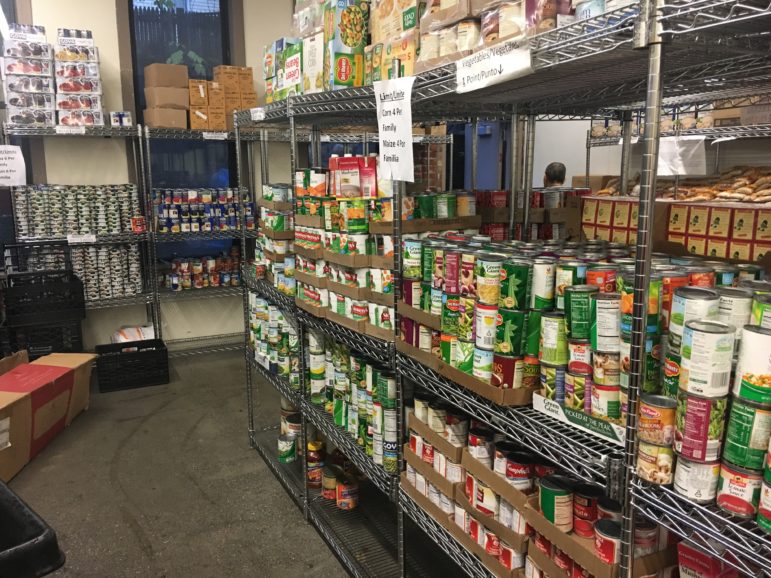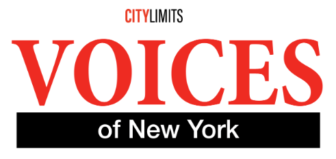
Kellie Ell
Part of the Solution’s food pantry in the Fordham neighborhood of the Bronx.
Read the original story in Spanish at El Diario
Translated and condensed by Carlos Rodríguez Martorell
“We have had to make changes, not because we have the resources but because we have no choice,” explained Bethania Perkins, founder of the Cienfuegos Foundation in Astoria, Queens, one of the many food pantries working with the Food Bank for New York City network.
It’s also among those now providing home delivery, responding to the fears of many immigrant families who are afraid to come out of their homes and stand in a queue. Their fear is stronger than their hunger.
“They believe that ICE could be around the corner, and many families have told us that they cannot afford to put themselves at risk standing in line,” says Perkins.
One in every four city organizations offering emergency food programs has been forced to make changes in order to serve a population fearful of the anti-immigrant policies promoted by President Donald Trump’s administration, according a recent Food Bank for New York City report.
Of the organizations operating within this food bank network, 36 percent are now delivering groceries to people’s homes, and 22 percent says they do so on a changing schedule and using extra discretion to protect immigrant families, the report found. A quarter of the food banks reported providing new services this year specifically to the immigrant community, including those who say they’ve received requests from clients seeking guidance on what to do with their children in the event they’re deported.
Food Bank for NYC President & CEO Margarette Purvis says the organization has a presence in 90 percent of the city’s zip codes.

Voices of New York spotlights ethnic and community reporting from around the city. Click here to read more.
“Hunger in the city is not haphazard: It is personal, and we know where it lives,” she says, adding that need is especially great in Brooklyn, The Bronx and Queens. Purvis explains that she has created a safety plan “never before seen in the Food Bank.”
Although the Trump Admistration’s proposed “public charge” rule – which would allow immigration authorities to consider someone’s eligibility for public benefits like SNAP in determining their green card or visa applications – is stalled in court and has yet to be implemented, its impact is still being felt.
“The latest obstacle to SNAP is fear,” lamented Purvis.
Perkins, whose staff of barely 10 volunteers serves some 600 people per week, explained that people see others losing their residency or green card status and assume it’s due to their use of welfare programs. Even if this information is in accurate, the fear spreads, and can prompt people to disenroll from their own benefits.
People usually turn to food banks for help applying for food benefit programs. But this year, only 5 percent of the programs in Food Bank for NYC’s report says they saw an uptick in the number of immigrants requesting such services, in contrast with last year’s 24 percent. Fewer immigrants are also approaching the non-profits for help filing their taxes, or applying for the Earned Income Tax Credit (EITC), considered one of the best tools available to fight poverty.
Purvis says that the Food Bank for NYC network is looking for creative solutions to serve an increasing number of people, not only immigrants, but anyone who needs to choose between paying for rent, a Metrocard or a meal. Of the network’s food pantries and soup kitchens, 85 percent says they’ve seen new people using their services this year, and 74 percent have seen an increase in attendance.
Dominican-born Perkins remembers going to bed hungry more than once when she was a child. She was 12 when her family left the town of Cienfuegos and settled in New York. The family’s low income only provided them with similar scarcity in a different setting.
“My mother would send us to summer camp so we could eat,” she says.
Student grants allowed Perkins to be the first in her family to go to college, and in 2014 she launched a foundation in Cienfuegos to help the sick and people with disabilities.
“The situation there is one of extreme poverty,” she says.
While there is an enormous amount of wealth in New York, it is not equitably distributed, and Perkins began to notice that people in the city had similar needs.
“I know because it is personal; I have experienced it myself,” she says.
That’s why the Cienfuegos Foundation opened a branch in Astoria, Queens. The staff of nine volunteers serve some 575 people per week, seek out donors, distribute food, and work to inform more families about the resources available to them.
“A mother came by recently with her baby, who was only a few weeks old, saying that she was hungry. She was a Russian immigrant. We have already put her in contact with SNAP,” Perkins recalls.
She says she understands the fears people have in turning organizations like hers for help.
“One person told us that they did not want food stamps because they had a friend whose green card had not been renewed the first time and had to go back to the Dominican Republic,” she says. “They did not know why, but they says that they did not want it to happen to them too. The worst part is that there are lawyers telling people not to take the assistance.”









One thought on “City’s Food Banks Offering Home Delivery in Response to Immigration Fears”
Need home food delivery